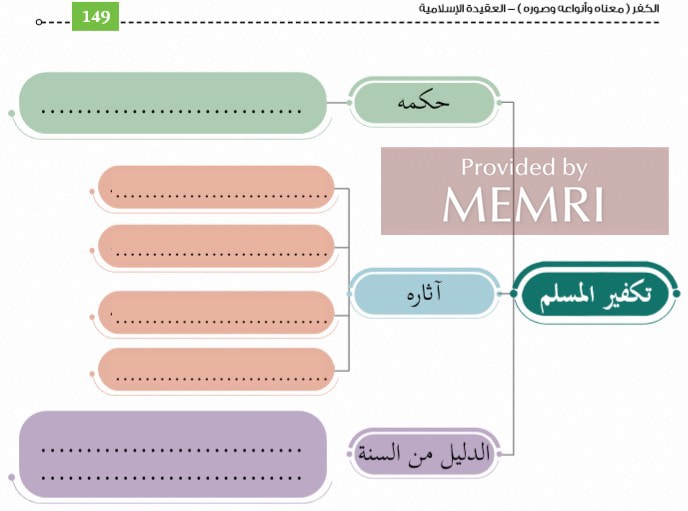One of the subjects addressed in the Qatari Islamic Education books is the meaning of the terms "polytheism" and "unbelief," as well as the attitude towards unbelievers, including Jews and Christians, among others. The study of these terms is aimed at instilling in the students a sense of their Muslim identity and reinforcing loyalty to their coreligionists and to prevent them from following the culture of anyone defined as an unbeliever.
The school textbooks stress the principle of "loyalty and disavowal" (al-wala wal-bara), that is, loyalty to fellow Muslims and renunciation of non-Muslims. They link the study material to the students' daily lives by asking about how they implement this principle in their relationships with non-Muslims in Qatar and abroad.
Chapter III will review attitudes towards non-Muslims in Qatar's school textbooks for Islamic education for grades 9 through 11:
"Polytheism," "Unbelief," And Their Punishments In Islam
As noted, the schoolbooks include extensive chapters discussing the terms "polytheism" and "unbelief," as well as the punishments for those who fall into those categories. The subject is first introduced in Grade 9, with a discussion of these terms, and the book defines adhering to them as "the worst of all sins," punishable by eternity in Hell. The students are asked to study and memorize verses from Quran Surahs 25 through 64, which focus on unbelievers and polytheists and the punishment that awaits them on Judgment Day.
The study unit opens with Surah 64 of the Quran, which the students must read and memorize, and the book states that the Surah deals with the damage caused to unbelievers on Judgment Day and states that this is a "warning about unbelief and its consequences."[24]

Explanation about Surah 64, which warns against unbelief (Islamic Education for Grade 9, p 20.)
The unit stresses that on Judgment Day, unbelievers' good deeds, such as "building schools and hospitals" will not be taken into account, because in order to be accepted good deeds must include loyalty to Allah, "which unbelievers do not have, so their deeds are for fame and praise."[25]
In addition to learning and memorizing the verses, students are also asked to enumerate the horrors of Judgment Day as mentioned in the verses, to imagine the unbelievers as they are sentenced to eternity in Hell and regret not believing in Muhammad, and to relate what they would advise themselves and their friends to do after learning about the painful results of unbelief.[26]
An entire chapter is devoted to the subject of polytheism: what it is, how to distinguish among the types of polytheism, evidence of the bitter fate of polytheists, and ways to avoid this fate.

The chapter on polytheism (Islamic Education for Grade 9, p. 55)
This chapter opens by noting that polytheism is the worst sin of all, because it sentences its perpetrator to eternity in Hell. It states: "Every Muslim must know this issue so that he can beware of it."[27]
According to the book, there are two types of polytheism: One is "greater polytheism" – that is, belief in another deity in addition to Allah – for which the punishment is exclusion from Islam and eternal Hell. This type of polytheism also allows the offender's property, and life, to be taken. "Lesser polytheism" – that is, swearing by the name of anyone not Allah and believing in superstitions – does not mean that the perpetrator is excluded from Islam, and will not necessarily spend eternity in Hell.[28]

Comparing greater and lesser polytheism (Islamic Education for Grade 9, p. 58)
The issue of unbelief is also discussed in the Grade 10 text, which asks the student to "believe in Allah the Almighty [and] to know His names and titles" as well as to know about the meaning, types, and forms of unbelief.

The chapter on unbelief (Islamic Education for Grade 10, p. 141)
The book explains that there are two types of unbelief: One is "greater unbelief," which includes denial and doubt of the word of Allah – the punishment for which is exclusion from Islam and eternity in Hell. "Lesser unbelief" is defined as not believing in Allah's mercy, fighting another Muslim, and swearing loyalty in the name of something other than Allah. Those guilty of this are neither excluded from Islam, and their punishment is not as bad.[29]
The Grade 11 book explains that people began to believe in multiple deities after the saints from the tribe of Noah died and the devil ordered the people of the tribe to create statues in the saints' image. At first, they did not worship them, it says, but as that generation died out, the people began to worship them. It goes on to enumerate the signs of polytheism: using amulets, spells, and consulting practitioners of witchcraft and fortunetellers.[30]

Explaining polytheism with a statue of Buddha (Islamic Education for Grade 11, p. 45).
Attitudes Towards Non-Muslims
The Grade 11 text discusses at length the issue of how non-Muslims should be treated. It warns students not to form relationships with unbelievers, and emphasizes the principle of loyalty to Muslims and disavowal of unbelievers.
Eleventh graders learn Verses 1-9 of Surah 60 in the Quran. This Surah, the book says, focuses on "purging the believers' hearts of affiliation with and loyalty to anyone who does not belong to the religion of Allah the Almighty." The first chapter of this unit is "It Is Forbidden To Ally Yourself[31] With Unbelievers."[32]

The chapter on the prohibition to ally with the unbelievers (Islamic Education for Grade 11, p. 26)
This chapter states that the spirit of these Quranic verses stresses the principle of loyalty to Allah, to the Prophet Muhammad, and to the Muslims, and to disavowal of anyone who does not follow their path. The verses, it adds, emphasize that it is this principle that unites Muslim society and keeps it distant from imitation of "other identities and societies."[33]
It goes on to explain the Quranic verses. Verse 1, which opens Surah 60 of the Quran, states: "O you who have believed, do not take My enemies and your enemies as allies, extending to them affection while they have disbelieved in what came to you of the truth..." This verse, it says, emphasizes that Allah forbids believers "from taking unbelievers as defenders and aides for whom affection, closeness, and friendship is felt," because they do not believe in the word of Allah and they harmed the Prophet Muhammad and his followers. The punishment for violating this precept, it says, is "the wrath of Allah." Believers are called upon to beware of the unbelievers, who "do all they can to kill, torture, expel, and curse the Muslims," and must sever relations with them even if they are members of their family.[34]

Quran 60 Verse 1: "O you who have believed, do not take My enemies and your enemies as allies..." (Islamic Education for Grade 11, p. 29)
Another chapter on the subject, titled "Loyalty and Disavowal," explains that what "loyalty" means is love for Allah, for the Prophet, and for his followers, and helping them and being close to them. "Disavowal," it says, means hatred and hostility towards the enemies of Allah. The obligations of those who love Allah include an obligation to wage jihad for His sake.[35]
The Punishment For Muslims Who Show Loyalty To Unbelievers
The chapter titled "Loyalty and Disavowal" also focuses on Allah's punishment for friendship with unbelievers. It stresses: "Allah prohibits alliances of any kind with unbelievers, and the Islamic nation must disavow unbelievers and their families... Allah states that forming an alliance with unbelievers excludes the perpetrator from the community... and severs his relationship with Allah." There are several degrees of loyalty to unbelievers, it says. The first is love for unbelievers, and even a belief that their religion is correct, as well as spreading unbelief and helping unbelievers against Muslims, and accepting their beliefs as true. The punishment for this, according to the book, is declaring the offender an unbeliever and excluding him from the Islamic community. The second degree of loyalty to unbelievers is sycophancy towards them and frequently meeting with them, imitating their holidays, customs, manner of dress, values, and names – and is one of the worst possible sins. The third is wishing to be like them – not out of love for them but from being blinded by their achievements in this world; in some cases, such loyalty can be forgiven.[36]
Attitudes Towards Unbelievers In Islam
According to the text, Islam classifies unbelievers into categories that reflect an "objective and realistic" approach towards non-Muslims. In this context, it points out that Jews and Christians are included among the unbelievers. The categories are as follows:
-
Protected individuals (dhimmis): Jews and Christians living permanently in Islamic lands; their lives and property and all their rights are protected.
-
Protection seekers: Jews and Christians living temporarily in Islamic lands as diplomats and emissaries, and all those who come to Islamic countries for purposes of trade, studies, and the like. Their rights are protected and their property and lives must not be harmed.
-
All those with whom there are agreements: Unbelievers who have truce agreements with Muslims. The agreements must be kept, and they must not be harmed.
-
All those with whom there is a state of war: There is no obligation towards them and their security is not assured. They started a war with Muslims in order to harm Islam, so they must be fought until they either convert to Islam or pay the jizia poll tax.[37]
Further on in the Grade 11 book, unbelievers are divided into two types. The first of these is those who have declared military, propaganda, economic, or political war on Islam and the Muslims and have collaborated in aggression against Islam. Muslims are prohibited from treating them as friends, and "they must be banned and hostility and hatred for them must be declared, even if they are very close to us. Anyone befriending them is an oppressor worthy of Allah's wrath."
The second type of unbeliever is those who are not hostile to Muslims, are not fighting them, do not want to harm them, and live among them. According to the book, Allah permits Muslims to form relationships with them and to act fairly towards them, to be neighborly, and to be close to them.[38]
One of the assignments in the book asks students to give examples of their relationships with non-Muslims – for example a neighbor, a merchant, or a chauffeur.[39] Another asks students to clarify the "permitted limits in all things connected to cultural exchanges between Muslims and non-Muslims, in the areas of science, finance, values, and customs."[40]
Attitudes Regarding The Concept Of Takfir – Accusing Other Muslims Of Unbelief
The Grade 10 textbook also addresses the term takfir – the practice of accusing other Muslims of unbelief – although it is mentioned only briefly, and there is no chapter devoted to it.
There are two mentions of the term in the book. First, it notes that Islam prohibits accusing other Muslims of unbelief; this occurs following a detailed explanation of actions that are against the religion, such as renouncing Islam, polytheism of any kind, and unbelief of any kind. Takfir is mentioned again in a small section headlined "Pay Attention," that states: "According to the religion, accusing another Muslim of unbelief is very grave. If [making this accusation] is widespread in a society, it is evidence of that society's weakness and destruction. Therefore, Islam bans accusing other Muslims of unbelief..."[41]

"According to the religion, accusing another Muslim of unbelief is very grave" (Islamic Education textbook for Grade 10, p. 59)
On page 146 of the Grade 10 text, students are again warned about takfir, but this time the book does not say it is forbidden in Islam, but rather states that "the Prophet Muhammad warned not to hasten to declare another Muslim as an unbeliever" because of the grave consequences of such an accusation – including making it permissible to kill the accused and take his property, or to force his wife to divorce him and strip him of his inheritance rights.[42] The students' assignments on the topic of takfir include asking them to write about the punishment for accusing other Muslims of unbelief and asking them to provide proof from the Sunna.[43] Another assignment asks them to present proof that "no Muslim should be declared an unbeliever without proof."[44]

Assignment on takfir (Islamic Education textbook for Grade 10, p. 149)





